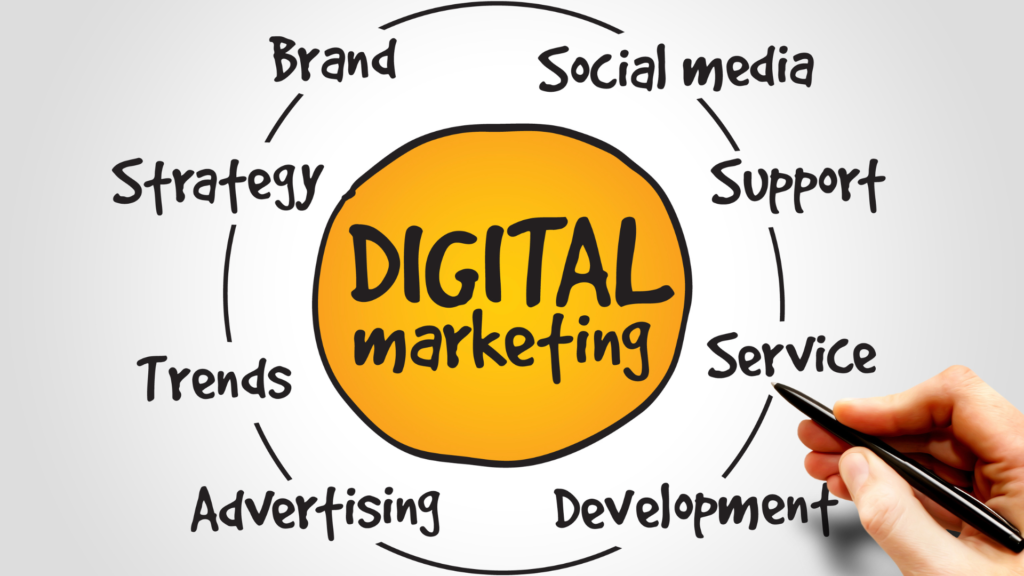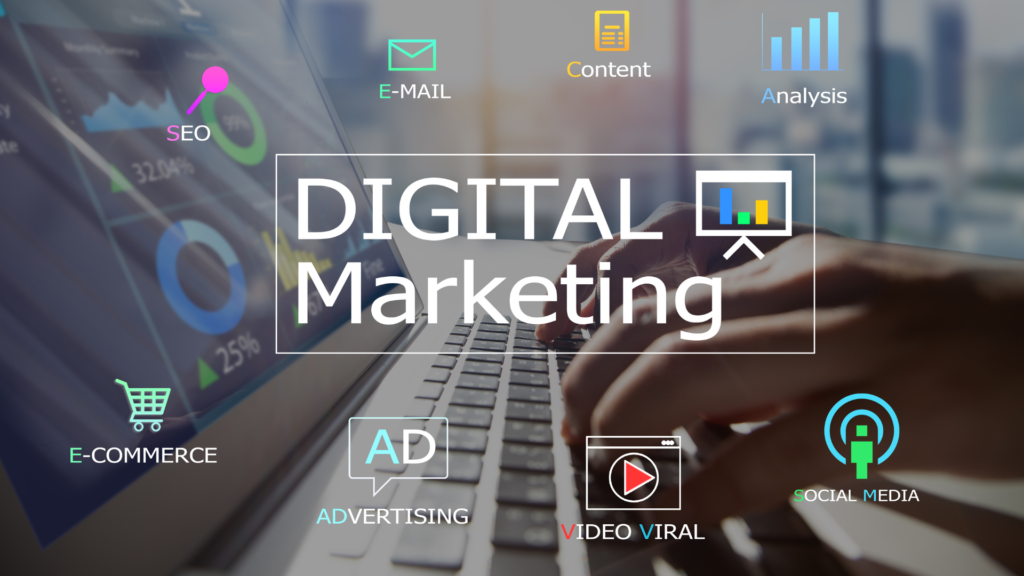
Introduction:
When it comes to allocating funds for digital marketing efforts within your company it’s important to consider how much you should invest. A strategic approach can help ensure that every dollar spent is maximized effectively and delivers results.
Mastering the changing business landscape
The business landscape has undergone significant changes due to the digital revolution. Companies must embrace digital marketing as an integral part of their overall advertising strategy if they want success in today’s competitive environment. This includes various channels such as social media, SEO optimization, content creation, and email campaigns among others that have proven effective at reaching target audiences across industries.
To ensure maximum impact with minimal effort, companies should prioritize these tactics when crafting their marketing strategies today – and into tomorrow! Don’t get left behind by ignoring this critical aspect of modern-day commerce; instead, stay ahead of the curve by embracing all things digital for your brand or company now!
The Importance of Digital Marketing
Digital marketing has revolutionized the way businesses connect with their target audience by providing unparalleled opportunities for personalization and impact. Unlike traditional advertising methods that rely on casting a wide net in hopes of reaching potential customers digital marketing allows companies to precisely pinpoint specific demographics based on factors such as age location interests or online behavior.

This approach enables businesses to deliver highly tailored messages that resonate more effectively with each consumer group – resulting in greater engagement and ultimately increased sales conversions over time. The emergence of social media platforms has ushered in an era where consumers are actively involved in brand conversations.
With Facebook, Twitter, and Instagram being integral parts of people’s lives today businesses can leverage this immense potential by creating compelling content that resonates with their audience’s interests and needs. By doing so they’ll be able to build stronger relationships with customers while also increasing engagement levels across all channels.
The Importance of Budget Allocation
To ensure success in digital marketing it is crucial to allocate a specific budget for these efforts. By doing so your company can guarantee that they have the necessary resources required to execute effective campaigns consistently. Don’t underestimate how important this step is – without proper funding, you may struggle with execution and ultimately fail at achieving desired results.
Digital activities are critical for business success but allocating funds wisely can be challenging. The budget allocation provides clarity and allows companies to proactively plan their campaigns while accurately measuring results. This eliminates any uncertainty surrounding financial investment in various channels or initiatives. With a clear budget strategy in place, businesses have greater control over how they allocate resources toward digital efforts.
To ensure that your business’s marketing efforts are effective and worthwhile allocating funds specifically towards them is essential. By doing so you can track ROI more accurately while also evaluating campaign success or failure objectively.

Additionally prioritizing initiatives based on their relevance to overall company goals becomes easier when there’s a budget in place for each one. This allows strategic decisions about which channels should receive the most attention as well as how much money needs investment in each tactic – all to achieve desired results quickly!
Digital marketing is an essential component of modern business strategy. By allocating a budget for these efforts you can take proactive steps toward maximizing your company’s online presence and engagement with customers. This empowers companies to build strong foundations that will lead them toward long-term success in today’s competitive digital landscape.
What to Consider When Setting Your Digital Marketing Budget
Business Goals and Objectives – What You Need to Know
Defining specific goals is key when allocating funds for digital marketing efforts. These objectives should be in line with your overall business strategy. Do you have specific goals in mind for your website? Are they related to increasing traffic, driving sales upward, or raising brand awareness levels? Or perhaps generating high-quality leads is what matters most right now.
Whatever the case maybe it’s important that these objectives are clearly defined so that strategies can be developed accordingly. With a clear understanding of what needs to happen next comes greater chances of success! By defining your objectives clearly, you can focus on allocating resources toward achieving them effectively. For instance, if increasing sales is a priority for you then investing in PPC advertising or email marketing campaigns that drive conversions directly could be ideal strategies to consider.
It’s crucial not only to prioritize each goal but also to ensure the budget reflects its importance and sets realistic expectations about what can be accomplished within it.

Industry Analysis and Competition
Digital marketing requires careful consideration of the competitive landscape and prevailing trends to allocate resources effectively. Analyzing rivals’ digital strategies can reveal valuable insights into their spending patterns as well as potential areas for differentiation.
Take note of which channels they prioritize – do they place more emphasis on social media advertising or rely heavily on SEO? To gain an edge over competitors, evaluate their online presence and engagement levels across various platforms. This analysis will reveal gaps where you can capitalize on potential customers who may be underserved by other businesses in the marketplace.
Target Audience Research
Digital marketing success hinges on knowing your target audience inside out. To optimize spending wisely create buyer personas that reflect different segments of customers based on factors such as age, gender location interests, and purchasing patterns. By doing so you’ll gain valuable insights into what drives their behavior – empowering informed decision-making when it comes to crafting campaigns tailored just for them!
To ensure that your marketing efforts are successful you need to understand who exactly it is that you’re trying to reach. By conducting thorough research into their preferences and needs through various channels such as social media platforms or surveys, you can tailor specific tactics towards them effectively.
For example, if your target audience consists of younger individuals who frequently use Facebook influencer advertising could be an excellent choice over traditional methods like billboards or TV commercials.

Digital Marketing Budgeting – Different Methods
When it comes to budgeting for your company’s digital marketing efforts many businesses turn to the percentage of revenue method. This approach involves setting aside a fixed portion of annual revenues specifically earmarked for promotional purposes. The exact amount allocated may vary depending on factors such as industry benchmarks and company growth stage. With careful consideration given to these variables, this strategy can prove effective in ensuring sufficient funding is available while avoiding overspending or underinvestment.
As a business owner operating in an aggressive industry, it’s crucial to prioritize investing wisely in your company’s future growth. This may mean allocating more funds towards staying ahead of competitors during the early stages of operation. However, for established companies with stable revenue streams, it makes sense to choose lower but consistent percentages that align with projected earnings.
Defining Specific Objectives and Establishing Budgets Based on Costs
The objective-based method is another way to determine your digital marketing budget. Rather than relying solely on revenue percentages, you define specific objectives that you want to achieve through this type of advertising. This approach allows for greater flexibility and focus in allocating funds toward achieving these goals. By defining clear targets upfront, it becomes easier to measure success down the line.

Set clear objectives to succeed:
To achieve business success, it’s essential to set clear objectives that align with your overall goals. These could include generating leads, boosting brand awareness, or acquiring new customers among others. Once you have identified these aims, estimate the costs associated with each one and allocate budgets accordingly. This approach ensures maximum impact for every dollar spent on marketing efforts.
When it comes to investing in your business’s future success there’s no one size fits all approach. Instead of relying solely on financial projections consider utilizing both methods available for greater flexibility and customization based on individual needs. Careful consideration is key when deciding which method works best for you!
Digital marketing is a tool for success:
Digital marketing has become an essential tool for businesses looking to thrive in today’s fast-paced world. However, finding the right approach can be challenging – some companies may find success using a combination of methods while others may benefit from customized solutions tailored specifically to their needs.
Ultimately what matters most is recognizing how crucial investment into digital marketing truly is and striking that perfect balance between available resources and desired outcomes to drive sustainable growth within this constantly evolving landscape.

Factors That Influence Digital Marketing Costs
Choosing the Right Advertising Platforms and Channels
Digital marketing success hinges on selecting the most effective advertising channels and platforms. The cost of each online ad channel varies significantly – for example, Google Ads versus Facebook Ads – so careful consideration is necessary when deciding where to allocate resources.
When it comes to choosing between Google Ads and Facebook Ads for advertising purposes understanding the costs associated with each platform is crucial. While both operate on different payment models such as pay-per-click or cost-per-impression, determining which one aligns best with your budget goals will help you make an informed decision.
Pros and Cons of Each Platform
When deciding which platform to choose for advertising purposes, it’s essential that you carefully weigh the pros and cons of each option based on factors such as target audience reach, engagement potential, and cost efficiency. Google Ads stands out in terms of its extensive user base and advanced targeting options – making it an excellent choice if these are important considerations for your business or brand. However, be sure not to overlook other platforms with unique strengths that may better suit your needs!
When it comes to advertising on social media platforms like Facebook, Ads offer a unique advantage – precise audience targeting based on demographic data and interests. This feature allows businesses to make informed decisions that maximize their return on investment (ROI). By assessing these factors carefully beforehand companies can ensure they are getting the most out of their ad spend while reaching exactly who matters most: potential customers!
Creating and Producing Content
To achieve success in digital marketing, it’s crucial to create content that resonates with your audience across various platforms. By setting aside funds for content creation you can ensure engaging blog posts, videos, and graphics – all tailored specifically towards each channel’s requirements.
Creating Content on a Budget
When planning your digital marketing budget, don’t forget about content creation costs. You may need to hire professional copywriters or video producers if outsourcing is the best option for you – but there are also in-house resources that can create high-quality material at a lower cost. Consider all options carefully before making any decisions on how much money should be allocated toward this aspect of your campaign.
Outsourcing vs In-House Resources – Which Is Best?
Content creation is an essential aspect of any business’s marketing strategy. However, deciding whether to outsource or rely on internal resources can be challenging due to various factors such as expertise availability within your team and cost considerations.
Outsourcing may provide access to specialized skills while freeing up internal resources for other critical tasks but weigh the pros and cons carefully before making a decision that suits both budgetary constraints and content requirements alike.
Conclusion:
Digital marketing can be overwhelming, but by considering factors that impact your budget you’ll make informed decisions. Understanding the costs associated with various advertising channels like Google Ads and Facebook Ads is key in tailoring content for each platform while keeping within budget constraints.
Additionally allocating funds towards creating engaging material ensures relevance across all platforms. With these strategies in mind navigating digital marketing becomes more manageable than ever before!
To achieve optimal cost efficiency when it comes to digital marketing efforts, finding the right balance between outsourcing and utilizing in-house resources is crucial. By embracing these considerations and investing wisely you can watch your campaign thrive while keeping expenses under control. Don’t miss this opportunity – embrace these strategies today!


